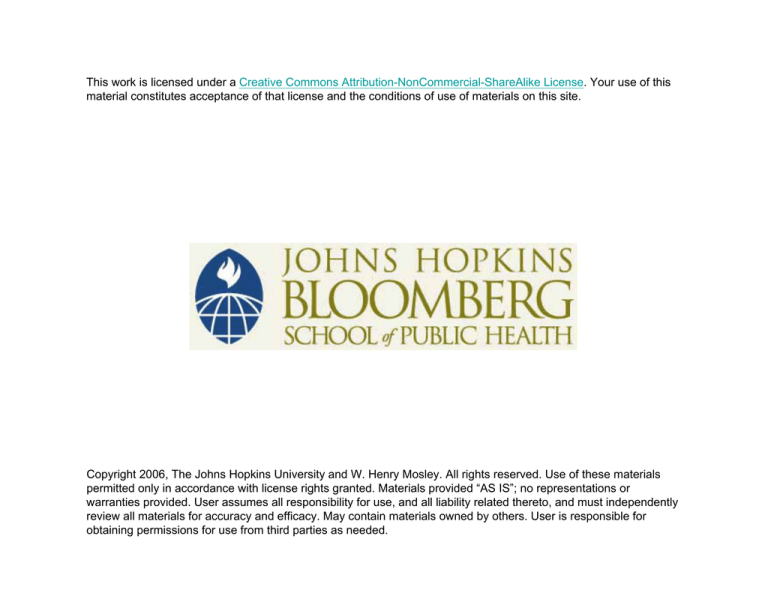
This work is licensed under a Creative Commons Attribution-NonCommercial-ShareAlike License. Your use of this
material constitutes acceptance of that license and the conditions of use of materials on this site.
Copyright 2006, The Johns Hopkins University and W. Henry Mosley. All rights reserved. Use of these materials
permitted only in accordance with license rights granted. Materials provided “AS IS”; no representations or
warranties provided. User assumes all responsibility for use, and all liability related thereto, and must independently
review all materials for accuracy and efficacy. May contain materials owned by others. User is responsible for
obtaining permissions for use from third parties as needed.
PFHS 380.665 FAMILY PLANNING POLICIES AND PROGRAMS
Introduction
W. Henry Mosley
A. Introduction
1. Course Introduction
a. Course schedule
b. Learning objectives
c. Class introductions
2. Course materials
All course materials (with the exception of a few handouts) are on Course
Supplement Web Site. Go to the course "Family Planning Policies and
Programs" in the Department of Population and Family Health Sciences
listing.
3. Working Groups
The class will be divided into small groups for most assignments. Each
group will have a diverse group of students based on information provided
on the class registration form. The working groups will be responsible for
guiding class discussions from time to time as well as preparing and
presenting the Final Assignment. Students are encouraged to work in
small groups on all assignments, but all required papers are to be
individually written.
4. Written Assignments
Students are encouraged to discuss the written assignments before
submitting their papers, but each student must individually prepare his/her
own paper for submission. All written assignments are to be in
MSWord format, 12 point type, single spaced. The required page
length will be given with each assignment. Unexcused late assignments
will lose one letter grade.
B. Session 1
Lecture Presentation: Introduction to Population Policies
(See Powerpoint Slides.)
Required Reading
The Unfinished Agenda: Meeting the Need for Family Planning in Less
Developed Countries. PRB Policy Brief, Population Reference Bureau,
2004.
Gillespie, D. Whatever happened to family planning, and for that matter
reproductive health? International Family Planning Perspectives 30 (1): 3438, 2004.
Recommended Readings
Chapter 2: “Origins and evolution of family planning programs.” In Judith R.
Seltzer The Origins and Evolution of Family Planning Programs in
Developing Countries, pub. Rand, Santa Monica, CA, 2002.
http://www.rand.org/publications/MR/MR1276/ accessed January 15, 2005
Finkle, JL, and McIntosh, CA. United Nations Population Conferences: Shaping
the Policy Agenda for the Twenty-first Century. Studies in Family
Planning 33: 11-23, 2002.
Caldwell, JC, Phillips, JF and Barkat-e-Khuda. The future of family planning
programs. Studies in Family Planning 33:1-10, 2002.
ICPD at Ten - Where Are We Now? A Report Card on Sexual Reproductive
Health and Rights. pub. Population Action International, Family Health
International, International Planned Parenthood Federation. 2004
http://www.populationaction.org/2015/_pdfs/reportCard/reportCard_final_e
ng.pdf accessed January 10, 2005
References
“Family Planning Programs in the Twenty-first Century”. Special Issue of:
Studies in Family Planning 33: March, 2002.
New Population Policies: Advancing Women's Health and Rights. Population
Bulletin, Vol. 56, No. 1, March 2001. http://www.prb.org




